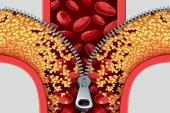AEGIS-II Misses Primary Endpoint, Dealing New Blow to HDL Hypothesis
CSL112, a human plasma-derived apolipoprotein A-I, failed to reduce 90-day MACE, according to top-line results.

CSL112, an investigational cholesterol efflux enhancer developed using human plasma-derived apolipoprotein A-I, the primary functional component of high-density lipoproteins, has failed to reduce the risk of 90-day MACE after acute MI, according to top-line results of the phase III AEGIS-II trial.
“As a result, there are no plans for a near-term regulatory filing,” drugmaker CSL said in a press release.
The results, which will be presented at the American College of Cardiology 2024 Scientific Session in April and published in a peer-reviewed journal, represent yet another strike against the hypothesis that raising HDL cholesterol levels will reduce cardiovascular events, an idea that has not panned out in the past. Indeed, the trial had been described as the “last big shot on goal for HDL cholesterol.”
AEGIS-II investigators enrolled more than 18,200 patients from more than 850 sites in 49 countries for the trial, which randomized patients with acute MI to four weekly infusions of CSL112 or placebo started within 5 days of first medical contact. There were no major safety or tolerability concerns with CSL112.
“We look forward to sharing our scientific learnings regarding cholesterol efflux and recurrent cardiovascular events,” said C. Michael Gibson, MD (Baim Institute for Clinical Research, Harvard Medical School, Boston, MA), who is leading the trial, in the press release.
Todd Neale is the Associate News Editor for TCTMD and a Senior Medical Journalist. He got his start in journalism at …
Read Full BioSources
CSL. CSL announces top-line results from the phase 3 AEGIS-II trial evaluating the efficacy and safety of CSL112 (apolipoprotein A-I [human]). Published on: February 11, 2024. Accessed on: February 14, 2024.




Comments